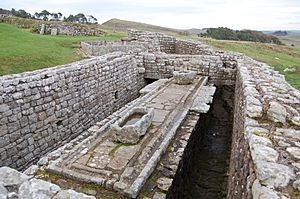Cuneus Frisionum facts for kids
The Cuneus Frisionum (say: KOO-nay-us Fri-SEE-oh-num) or Frisiorum cuneus were special groups of soldiers in the Roman army. These soldiers were not originally Roman citizens. They came from a Germanic tribe called the Frisians. They were called "auxiliaries" because they helped the main Roman legions.
Contents
Frisian Soldiers in the Roman Empire
The Roman Empire was huge, and it needed many soldiers to protect its borders. Sometimes, they recruited people from tribes they had conquered or made alliances with. These groups, like the Frisians, would fight alongside the Romans. They often kept their own fighting styles but used Roman equipment and training.
The Housesteads Stones
Two important stone carvings tell us about these Frisian soldiers. They were found at a place called Housesteads in Hexham, England. Housesteads was a Roman fort along Hadrian's Wall, which was a big wall built to protect the Roman Empire.
These stones were made by soldiers from a place called Twente (Tuihanti). This was in the 3rd century, between the years 222 and 235 AD. The soldiers carved these stones to honor a special god.
Who was Mars Thingsus?
The stones were dedicated to a god named Mars Thingsus. Mars was the Roman god of war. "Thingsus" comes from "Thing," which was a type of ancient Germanic assembly or meeting. So, Mars Thingsus was like a god of war and justice for these Germanic soldiers. They believed he watched over their meetings and battles.
What the Stones Say
The messages on the stones are written in Latin. They are a bit hard to read because the Latin isn't perfect. But they basically say:
- "To the god Mars and two goddesses called Alaisiagae, and to the divine power of the Emperor, the Germanic tribesmen from Tuihantis, who were part of the Frisian unit at Vercovicium (Housesteads), and were loyal to Emperor Severus Alexander, happily and deservedly kept their promise."
The second stone says something very similar:
- "To the god Mars Thincsus and the two goddesses, Beda and Fimmilena, and to the divine power of the Emperor, Germanic tribesmen from Tuihantis happily and deservedly kept their promise."
These messages show that the soldiers were thankful to their gods and loyal to the Roman Emperor.
Why "Frisian" and "Tuihanti"?
It's interesting that the stones mention "Tuihanti" soldiers but call them part of a "Frisian" unit. The Tuihanti were actually a separate tribe from the Frisians. There are a few ideas why this might be:
- Affiliation: Maybe the Tuihanti saw themselves as connected to the Frisians in some way.
- Recruitment: It's possible that Frisians hired the Tuihanti soldiers for this mission.
- Roman Engraver: Most likely, the Tuihanti soldiers couldn't write Latin themselves. They probably hired a Roman person to carve the stones. This Roman engraver might have just called them "Frisians" because they were a well-known Germanic group from that area. It was easier than explaining every small tribe.
These stones give us a cool peek into the lives of soldiers from different cultures who served in the mighty Roman army.
 | Ernest Everett Just |
 | Mary Jackson |
 | Emmett Chappelle |
 | Marie Maynard Daly |


